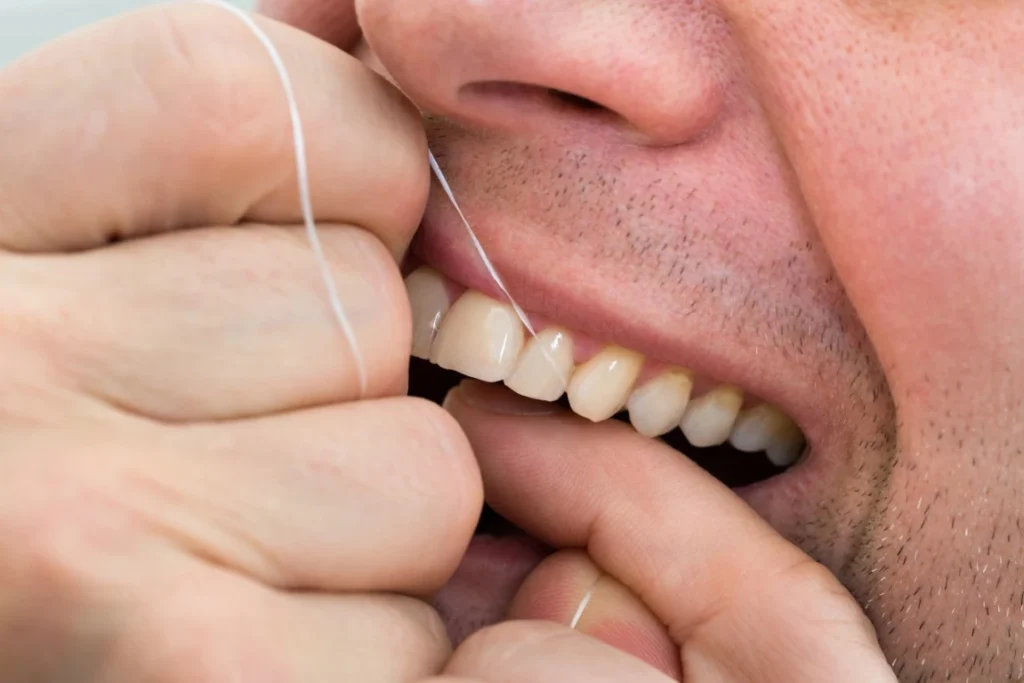Flossing is crucial in maintaining oral health, yet many people skip it or struggle to make it a habit. While more traditional options like physical floss and floss picks are a great way to boost oral health, water flossers are a more high-tech rival on the market. Both options are great for improving your oral health, but which is the better choice for your routine?
In this blog, we’ll discuss the importance of flossing, how water flossers work, why dental floss remains a favorite among dental professionals, and which option may suit you best.
The Importance of Flossing
When you think of flossing, you probably think of it as a step to remove food from between your teeth. However, this practice goes beyond that and is an essential step in protecting your oral health. When plaque accumulates between your teeth and along your gum line, it can lead to cavities, gum disease, and systemic health issues like heart disease. Flossing regularly is essential for a few different reasons, including:
- Preventing Gum Disease: By flossing every day, you remove plaque and bacteria from your teeth before they can harden into tartar.
- Improving Bad Breath: Trapped food particles can lead to chronic bad breath, also known as halitosis. By flossing, you can remove the particles contributing to bad odors.
- Promoting Gum Health: Like any other tissue, your gums need stimulation to heal from ailments. When you floss, you stimulate circulation, reducing inflammation.
While flossing is essential for protecting teeth from harm, it isn’t common. A study by the American Academy of Periodontology found that about 32% of U.S.-based adults over 30 floss their teeth daily. But, with so many flossing options on the market, it is never too late to incorporate this practice into your routine. Two of the most popular options include water flossers and traditional floss.
How Water Flossers Work
Whether you follow a strict flossing schedule or you’re just getting started with the practice, you may want to consider water flossers. These devices use a steady stream of pressurized water to clean between your teeth and along the gumline. They are incredibly effective at removing the toughest plaque and debris from between your teeth.
Water flossers direct a steady stream of water precisely where you aim it, helping you address any irritation within your mouth. The water pulsates to dislodge plaque and food debris while providing your gums with a comfortable and beneficial massage. Water flossers are especially helpful for individuals with:
- Braces and other orthodontic appliances
- Sensitive gums or periodontal pockets traditional floss may otherwise irritate
- Dental work like bridges, implants, or crowns
Why Dental Professionals Love Dental Floss
Despite the innovation of water flossers, traditional floss remains a go-to tool among many dental professionals for good reasons. First, they are a powerful scraping tool. Dental floss physically removes the toughest plaque from the sides of your teeth and under your gum line, providing a deep clean.
Additionally, floss is a great option for all types of teeth, including those with tight spaces where water flossers may struggle. One major benefit of traditional floss is how budget-friendly it is. This budget-friendly nature makes it accessible to all dental patients. Finally, this tool is portable. When it is easy to carry, you are more likely to use it regularly.
While flossing requires proper technique and can take time to master, it’s an effective and reliable method for maintaining oral hygiene. If you want to ensure the health and well-being of your gums and teeth, it is best to consider incorporating this into your daily oral health routine.
Which Should You Incorporate Into Your Routine?
Both dental floss and water flossers have their strengths, so the right choice for your routine will depend on your needs and preferences. If you have healthy gums and teeth with minimal gaps, are looking for a low-cost option, or prefer a hands-on approach to oral hygiene, choosing to use dental floss might be best for your routine.
However, if you have braces, dental bridges, crowns, or other dental appliances, find traditional floss difficult to use, or are trying to manage severe periodontal disease, water flossers may make incorporating this into your everyday routine easier. This isn’t the only option, though. Some dental patients may find it best to incorporate both into their routine.
If you want to use both options, use dental floss to physically scrape plaque and food particles from between and on your teeth. Then, follow up your physical flossing with a water flosser. This will help remove tougher debris you may initially miss with floss and massage your gums, improving blood flow and reducing inflammation.
Protect Your Gum Health at Hendersonville Family Dental
Ultimately, the best choice for your gums is the one you can sustain. Flossing daily removes tough plaque and debris, helping you prevent cavities, gum disease, and bad breath. By choosing the option you can maintain, you are doing everything in your power to protect yourself from costly and frustrating oral health ailments.
If you are dealing with oral health concerns like gum disease or cavities, our team at Hendersonville Family Dental is here to help. For years, we’ve provided the most reliable dental care to patients across Hendersonville, North Carolina. Whether you’re experiencing minor oral health concerns or need more intensive care, we’re here to support you every step of the way.
If you would like to schedule an appointment with our expert dental team or have any questions about our services, don’t hesitate to contact us today.





Follow Us